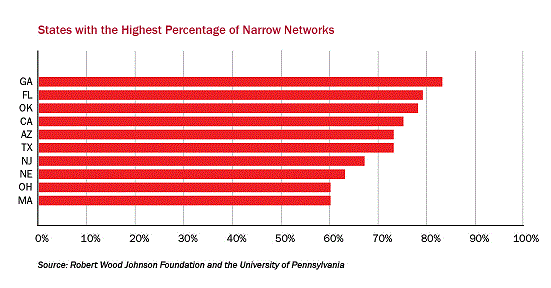Narrower Doctor Choices Coming For Obamacare And Employer Plans
By Bruce Japsen
8/30/2015 - Forbes
As health care costs rise a bit faster than recent years, look for more health plans offered by employers and on public exchanges under the Affordable Care Act to pare their lists of doctor and hospital choices for 2016.
Health insurers are already disclosing plans to maintain their business on government run exchanges under the health law, but there will be more plans offered with more limited lists of doctors and hospitals, new reports indicate. The narrowing of provider networks comes at a time medical providers worry the proposed acquisition by Anthem(ANTM) of Cigna(CI) and the merger between Aetna (AET) and Humana (HUM) could lead to fewer choices.
But health benefits' analysts say it's not necessarily a bad thing if health plans and employers cull from their lists of doctors and hospitals those that aren't achieving whatever quality metrics have been established. Consumers will begin to get a glimpse of their new benefits in the coming fall open enrollment period.
Health plans are introducing more narrow networks that limit doctor choices under the Affordable Care Act
"As people become more aware of the wide differences in quality and price, it's inevitable that that information will be used in contracting with better performing providers and hospitals," said Steve Wojcik, vice president of policy at the National Business Group on Health, which represents some of the nation's largest employers. "To get better value, people on the exchanges are making this choice often."
About one-quarter of large employers responding to the National Business Group on Health's 2016 health plan design survey released this month said they are "now offering high-performance networks," the report linked here shows.
On the public exchanges, consumers are likely to find an increasing number of narrow network plans, though it may vary from state to state. A nationwide report released by the Robert Wood Johnson Foundation and written by researchers at the University of Pennsylvania showed in four states - Georgia, Florida, Oklahoma and California - "at least three in four" health plans on public exchanges have networks "that cover 25% or fewer of all area physicians."
Plans must narrow networks, researchers say, because insurers can no longer deny people coverage due to pre-existing conditions and must cover certain essential health benefits. While this means Americans are no longer discriminated against when it comes to buying health care coverage, it can lead to higher costs if they want a large number of doctor and hospital choices.
"Network composition is a major way in which insurance companies can attempt to control costs in the marketplace; and for consumers there is often a tradeoff between access and price," the Robert Wood Johnson Foundation’s Kathy Hempstead said of the report.
